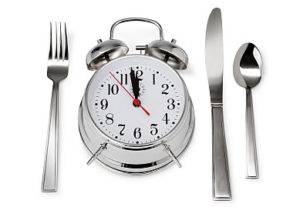 One of the most common mistakes I see in American eating behavior is our impatience with food. Let’s face it, as a society, patience is not a strong point. Many will argue that our inability to wait has spawned thousands of products and services that fuel our need for speed in all areas of our lives, and some of them have been a wonderful addition to our lives. Take our cell phones, for example.
One of the most common mistakes I see in American eating behavior is our impatience with food. Let’s face it, as a society, patience is not a strong point. Many will argue that our inability to wait has spawned thousands of products and services that fuel our need for speed in all areas of our lives, and some of them have been a wonderful addition to our lives. Take our cell phones, for example.
Our bodies, however, haven’t gotten the memo. If you want to increase your health, lose weight, manage stress, sleep better, and enjoy a more fulfilling life, I recommend slowing down. As a high energy, over-achiever myself, I can assure you that there is some value in creating time for things that matter. Like most behavior change, it is a work in progress, but well worth the focused effort.
When not to wait: As a general rule, we tend to wait until we are famished to prepare and eat our meal. Poor meal choices are most commonly caused by our lack of preparation and not eating often enough throughout the day. This results in eating the wrong foods too quickly, and many times without even tasting them. Getting too hungry sends out stress signals, which raises cortisol and leads to a cascade of digestive distress and weight gain. If this is a regular habit, my guess is you are struggling with an expanding waist line. The rule of thumb here is to eat every 3 to 4 hours. They don’t have to be full meals, but they definitely have to involve protein, phytonutrients and fiber. If you get into the habit of eating regularly throughout the day, you can be assured of making better choices and not over consuming your meal and beverages.
When to wait: Below is a list of suggestions on how to increase satisfaction and decrease digestive distress, fatigue and weight gain. Although these exercises may take some practice, the results are well worth it!
1. Sit down when you eat. The body digests food better in a relaxed state. Leave the multi-tasking alone and have a seat!
2. Before digging in, take a moment to say thanks. Take the extra second to pay homage to the blessing. There are people starving all over the world, including right here in the US. Appreciation is good for digestion.
3. Drink a glass of water before consuming anything. Begin while preparing your meal, and finish the glass within the first couple bites. This will reduce the “starving” feeling, and decrease your need to drink a high calorie beverage quickly because you are thirsty.
4. Breathe between bites. Finish what is in your mouth (that’s just good manners) and take a moment to swallow. Take a deep breath and then reach for that next mouthful.
5. Make it special. Take smaller bites. Actually take the moment to chew slowly and TASTE the food. Europeans aren’t “fat,” because eating is an “experience.” I also recommend using nice dishes, an attractive table setting and good company wherever possible.
6. Stop before you are stuffed. The body will turn hunger signals off when it is satisfied, however, there is a delay in the response time. The above suggestions will help assist you in becoming more aware of when the body has had its fill. Over-consuming also triggers a stress response that leads to a cascade of hormonal changes and signal the body to store fat.
Each person should walk away from a meal happy and satisfied. There is no such thing as indigestion and heart burn with folks who follow the above recommendations on a regular basis. We are all busy, but with some planning and some focus, it is possible to create better eating habits that lead to a new appreciation for food, and the miracle of digestion. Try sitting back and relaxing through your next meal. You will be amazed at how much less you eat, and how much better you feel for the next several hours!
Check out Jerny’s previous articles on her Rules for Eating here: #1, #2, #3, #4, #5



















